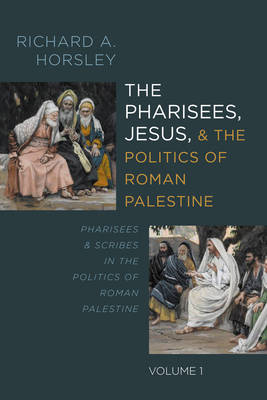
- Retrait en 2 heures
- Assortiment impressionnant
- Paiement sécurisé
- Toujours un magasin près de chez vous
- Retrait gratuit dans votre magasin Club
- 7.000.0000 titres dans notre catalogue
- Payer en toute sécurité
- Toujours un magasin près de chez vous
The Pharisees, Jesus, and the Politics of Roman Palestine, Volume 1
Pharisees and Scribes in the Politics of Roman Palestine
Richard A Horsley
Livre broché | Anglais
49,95 €
+ 99 points
Format
Description
Understanding of the Pharisees and other scribal groups in the late Second-Temple era has been obscured by the imposition of synthetic constructs of (early) Judaism in the fields of biblical studies and ancient Jewish history. Similarly, the conflict between the Pharisees and Jesus has been obscured and distorted by the continuing imposition of the synthetic constructs of (early) Judaism and (early) Christianity. When the early Hasmoneans restored the temple-state in Judea, the Pharisees stepped into the role of scribes as their intimate advisers. The Pharisees' principal concern was for the operation of the temple-state according to its politeia, the covenantal laws/customs of the temple-state. In their political practice this meant active opposition to and by expansionist Hasmonean high priests such as John Hyrcanus and Alexander Jannaeus and their mercenary troops. Far from having withdrawn from political life, they managed to consolidate their authority as the intellectual-legal "retainers" of the temple-state under Alexandra Salome. In the increasing breakdown of political-economic order under more direct Roman rule through the high priests, the Pharisees evidently managed to become ever more influential in the temple-state as leading high priestly figures became ever more complicitous in Roman rule. After the Roman destruction of the Judean temple-state there is little or no evidence of the Pharisees playing any role in the politics of Roman Palestine.
Spécifications
Parties prenantes
- Auteur(s) :
- Editeur:
Contenu
- Nombre de pages :
- 282
- Langue:
- Anglais
Caractéristiques
- EAN:
- 9798385221691
- Date de parution :
- 31-10-25
- Format:
- Livre broché
- Format numérique:
- Trade paperback (VS)
- Dimensions :
- 152 mm x 229 mm
- Poids :
- 385 g

Seulement chez Librairie Club
+ 99 points sur votre carte client de Librairie Club
Les avis
Nous publions uniquement les avis qui respectent les conditions requises. Consultez nos conditions pour les avis.





